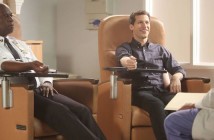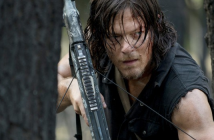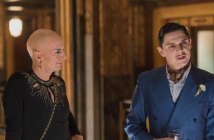23/2/2014, 9:00 p.m. (EST), HBO
True Detective trains you to watch it. It sticks in your brain until it virtually alters your chemistry, until it gets you on its level. It’s easy to say the show forces you to think like Cohle, that it pushes you into your darkest corners and makes you take a look at the monsters you keep hidden under your mental bed, but that isn’t the whole story. It also trains you to think like Marty. From the moment we watched Cohle pick up that Devil Catcher in the abandoned school at the end of “The Secret Fate of All Life,” what followed in “Haunted Houses,” where we track him in a downward spiral until the case forces him off the force and into estrangement from his girlfriend and his partner was inevitable. But similarly, The second I saw Beth, I saw her like Marty did, and saw what must be coming. There’s a reason that “Time is a flat circle” monologue from last week has stuck with me. There’s a reason it has remained so hypnotic. There’s a reason why, when all is said and done, I’m likely to remember that just about most of all when I reconsider season one of True Detective.
It’s because this is a show about the way the past is doomed to repeat itself, about cycles we can never quite break free from, the demons lurking always just over our shoulder, just out of reach. The ones that come to call when we try to fall asleep at night. Throughout “Haunted Houses,” various people seem to respect Rust as somehow above all of this, a man of integrity, a man who knows who he is. But the sick joke at the episode’s rotten core is that he isn’t any better than anyone else we see, just differently constituted. He is as obsessive, as prone to self-destruction, and as self-righteous as Marty. He just wears it better, focuses his attention where it needs to be more accurately. He builds himself the maze from which he’ll never escape. But that doesn’t make him any less trapped.
Over the course of this season, Marty has constantly felt less like a co-lead than a supporting player. In part this is because Rust, and McConaughey’s performance, is so hypnotic, he creates a gravitational pull around his every movement and musing. In part, it’s because ultimately, this is more Rust’s story: he caught the case, he let it get under his skin, and in 2012, he is the one suspected of perpetrating the Yellow King killings. But “Haunted Houses” is a true Marty episode, tracing his psychology and letting us in on how he got from that troubled, disconnected place we saw him in when the story shifted to 2002 last week to the man we see sitting before us in 2012. We watch Rust unravel here, to be sure, but this week, he plays a supporting role to Marty’s slow unraveling.
The day that Marty gives in to his demons is just like any other. Sure, seeing Beth is his trigger, but it isn’t like he hasn’t seen dozens of pretty girls in the intervening years, and he doesn’t seem to remember her from that bunny ranch back in ’95. No, what we’re seeing isn’t the perfect confluence of events that forces Marty, against his will, back into the wilderness. What we’re seeing is a man giving in, just like we saw Rust do back in “Who Goes There” as he became Crash again and traveled back into the heart of darkness. Marty would tell you he had broken the cycle before that day, but that’s just self-rationalization. This has happened before, and given enough time, it will happen again. These men are perpetually trapped in their own devolutions. The only difference is that while Marty closes his eyes to the truth of his behavior, Rust can’t seem to look away from the sun. Marty’s blindness is of his own creation, but Rust is afflicted with what Marty calls “the detective’s curse” just as much. He’s just too busy seeing his own conception of the forest to notice the trees.
Harrelson is fantastic in the episode as a man luxuriating in his own delusions, unaware of just how beastly he is. He barely notices when his presence drives his daughters away, as he chows down on their leftovers and commandeers their TV. He doesn’t even seem to recognize the significance of Maggie not returning his declaration of love. He envisions himself as the perfect family man, and buys into it so wholly all of his mistakes become part of his efforts to be a good father. He doesn’t see his family falling apart because deep down, he doesn’t want to. He’s too damn in love with the way he sees his life to understand he’s not looking at reality. He’s viewing his family through a warped and fractured mirror, and he’s the one causing the refractions, because what he’d see otherwise would repulse him.
“Haunted Houses” traces the slow dissolution of the Cohle-Hart partnership, of the Hart marriage, and of the two men who have formed the center of this season individually. Yet at every step, the episode pulses with power and meaning; it drags us down corridors we’d rather not notice to rooms we’d prefer never to visit. Cohle keeps pushing in the investigation, even though he’s hitting walls, and even though if he paused for a second, he’d see he’ll never solve this case through proper channels (query whether that’s why he goes off the grid for so long). Maggie seduces Cohle (not that it takes much effort) not out of attraction to him, though I think that is there, but because she knows this will hurt Marty, and she wants to burn him the way he has burned her. Marty goes back to the bottle and Beth, both because they let him forget, for a moment, the places he’s meant to be and the ways he has failed the people that matter to him.
True Detective trains you to watch it. It forces you to think about it in elliptical, poetic, philosophical terms (which is why these reviews teeter constantly on the precipice of pretension, when they don’t dive in completely). Sometimes that means not confronting certain aspects of the show, but then, that is ultimately part of it’s point. As much as this is the story of two men with blind spots that prove their undoing, it is a show that asks us to confront our own blind spots, about it and about ourselves. It is also a show that dares us to be enthralled by the long, meandering monologues of Rust Cohle and then asks us whether we, too, aren’t just a little bit too in love with the darkness. This show doesn’t shy away from ugliness, from bleak atmospheres, run down settings, and the monsters of two types that populate its world: those that skulk around the edges, mostly unseen, and those that keep the other bad men from the door. “Haunted Houses” is a grimy piece of television that makes you feel a deep distaste for most of the characters then asks you to extrapolate that to yourself and maybe to the larger world. But there is a dark allure to the proceedings that pulls you in and makes you almost not want to come up for air. This is great pulp television of the sort that haunts you like a second shadow long after the credits roll. It follows you throughout the days after an episode, and floats just outside of your vision when you look in the mirror. There’s a monster at the end of this dream, we’ve been told. That makes it easier to overlook the monsters that have populated this fever-dream all along. But it doesn’t make doing so right.
The Roundup
- -“A man’s game charges a man’s price. Take that away from this if nothing else.”
- -“All my life, I wanted to be nearer to God. The only nearness…is silence.”
- -“If you get the opportunity, you should kill yourself.”
- “You know, Marty, without me, there is no you. So type the fucking report, man.”
- -“The man with the scars was worst.” “The scars?” “The giant.”
- -“He said there was no such thing as forgiveness. People just have
short memories.” “You think Cohle was wrong about that? Forgiveness?”
“Less and less.” - “I’ve seen more souls lost down a bottle than down a pit. At the same
time, hard to trust a man can’t trust himself with a beer.”




